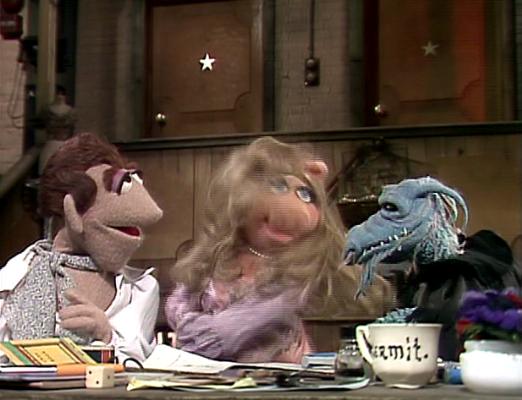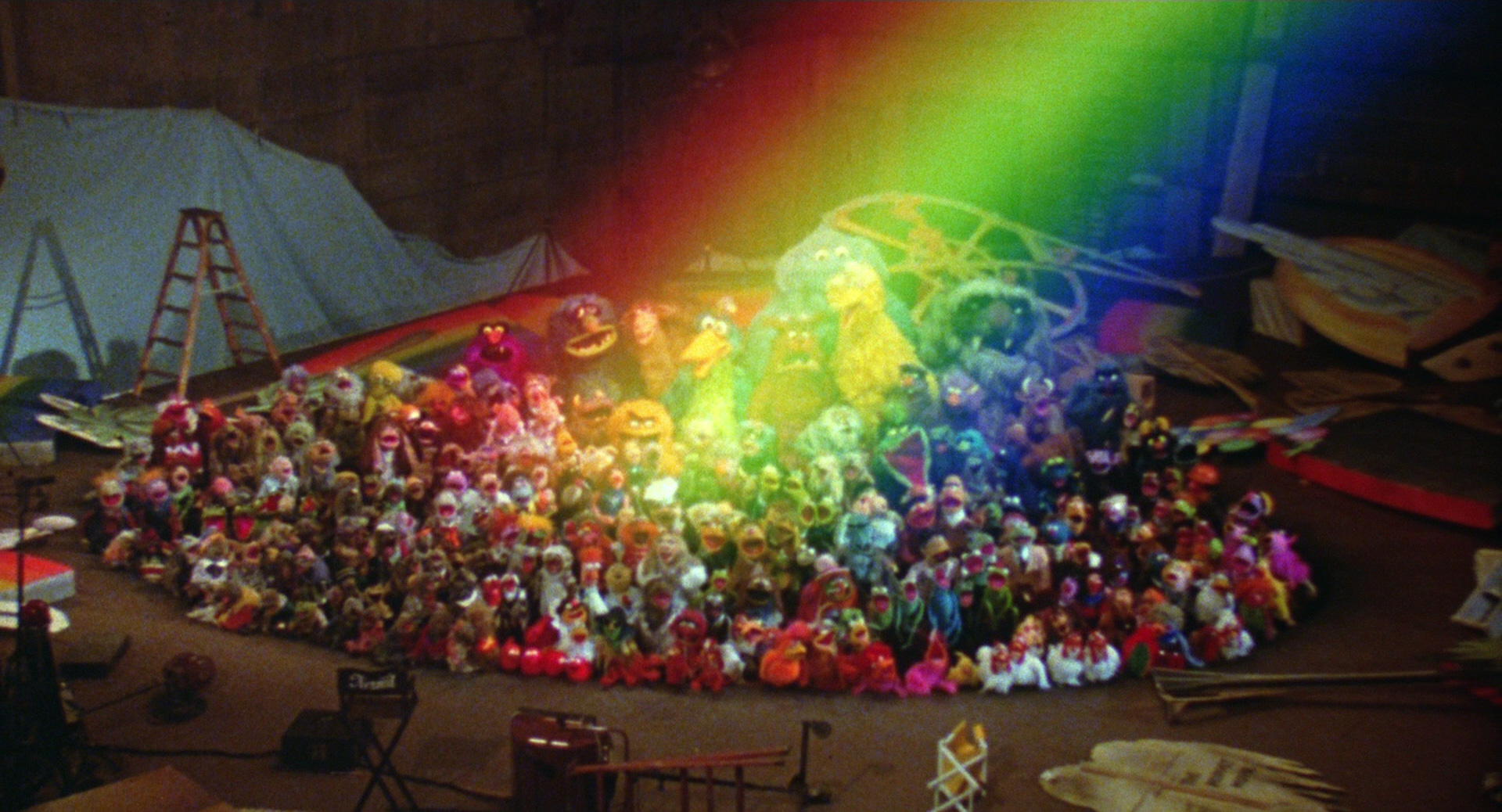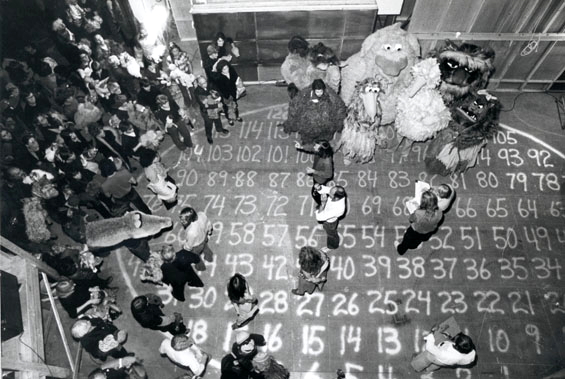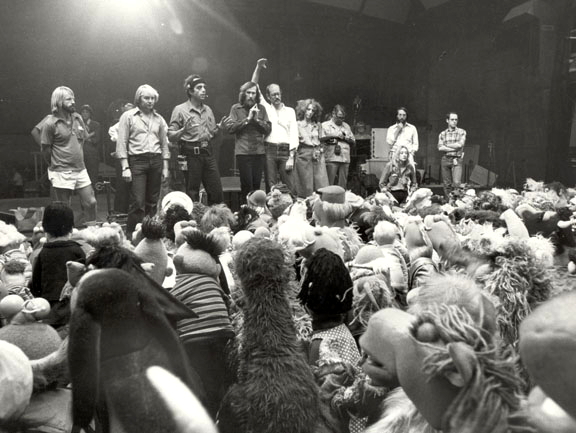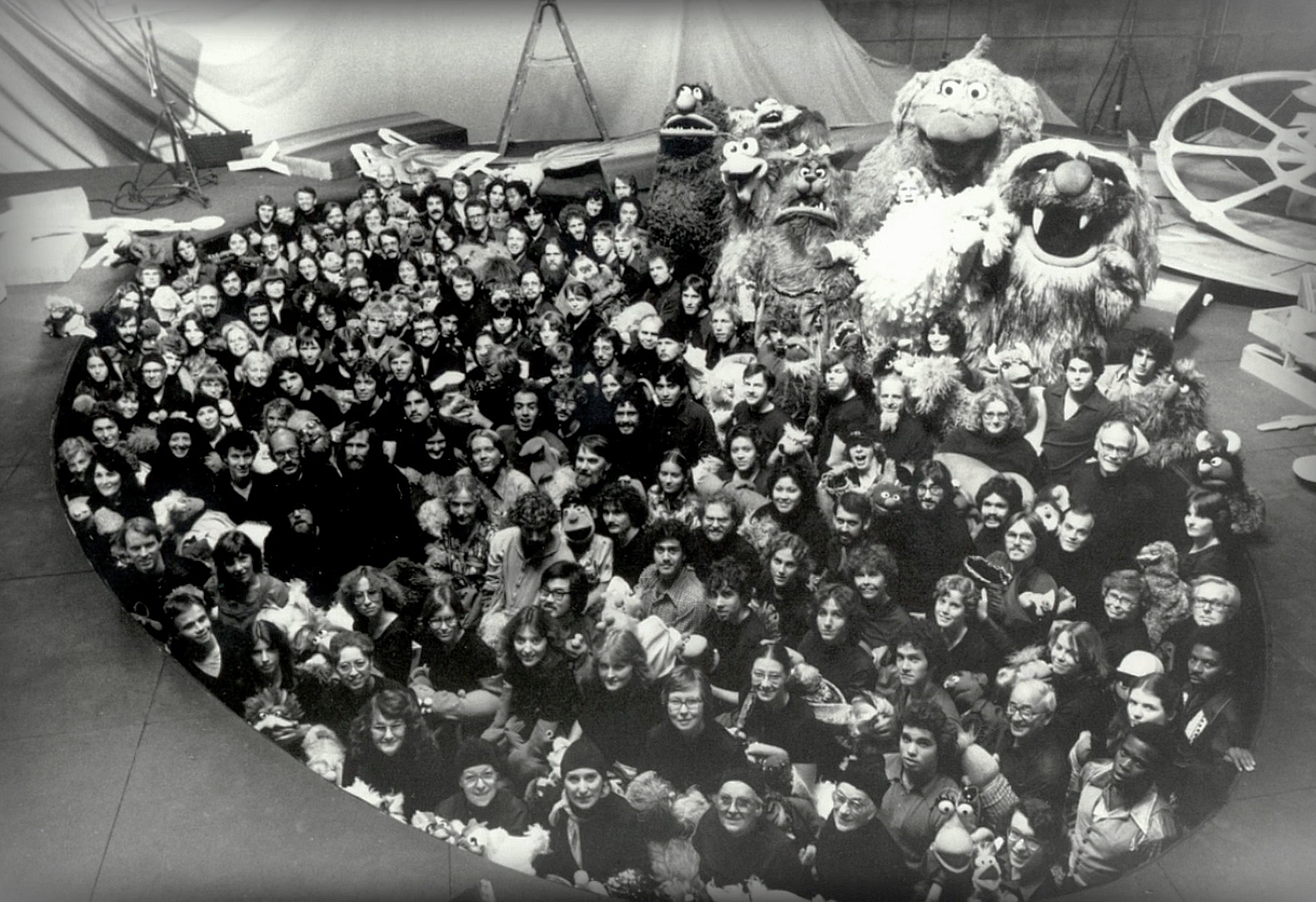My my, where does the time go? Let's see...where was I?
Oh yes, my favorite Muppets! Today I wanted to look at Richard Hunt. I've discussed this puppeteer at length in my posts on Scooter as well as the failed series Dragontime, but I never actually nailed down who his greatest characters were.
The important things to know about Hunt were that he was born to be a puppeteer. He never truly felt as free or as outgoing as he did when there was a puppet attached to his arm. Through his characters, he showed his childlike wonder, his boundless energy, and his array of funny voices. He loved to help others. He was often found performing as the extra arm for a live-hand puppet, meaning he'd be right up alongside Henson, Oz, or Nelson as they performed their iconic roles.
But most importantly, he loved to make people laugh. He was the puppeteer who would most likely entertain guests by grabbing a random puppet and putting on an improvised performance. These fun-loving elements bled into his characters, and it's a shame that soon after Henson passed away, Hunt followed. While he may be gone, he is not forgotten.
__________________________________________________________________
10) Belmont - The Christmas Toy
I always try to include one Muppet based on a pure-design aesthetic and to me, none of them are cooler than Belmont the rolling horse. (Even the builder Ed Christie chose Belmont as his greatest creation in 22 years of work back in 2000.) Hunt plays him as more of a dim-witted character who is at once easily-excitable and slow-talking, creating a strange speaking pattern.
__________________________________________________________________
9) Gunge - Fraggle Rock
While Hunt is better known for his turn as Junior Gorg in Fraggle Rock, there is another childish ogre character of his that I prefer more. So instead, I chose Gunge as the representative from this show. Along with Philo, the two rat-like creatures serve as right-hand-men to Majory the Trash Heap. Like Hunt, Gunge is the more naive and energetic of the two creatures. Hunt tends to find himself playing the "child" character to a more mature counterpart, possibly due to his youth when he joined the Muppet repertoire. (Of the main five original puppeteers, he was the youngest.)
__________________________________________________________________
8) Don Music - Sesame Street
Before I began this blog, I had no idea who Don Music was. He was cycled out of the show by the time I had started watching it regularly in the early '90s, allegedly due to the bad influence he had on children (namely, banging your head on hard objects when things don't go your way). Maybe that's true and maybe it was a good thing to remove him from impressionable eyes, but hey, Hunt was an artist. And artists get frustrated. And sometimes they need to release that frustration in destructive ways. Every Muppet puppeteer used their characters to unleash the feelings that they couldn't reveal in public, and Don Music only provided a cushy felt medium that also produced a funny sound whenever Hunt got upset. If you can't use a puppet to slam against a piano, what can you do?
__________________________________________________________________
7) Right Head of the Two-Headed Monster - Sesame Street
Richard Hunt and Jerry Nelson were quite the dynamic duo. They portrayed many live-hand puppets and puppet pairs together so it was only a matter of time before those were combined into a single puppet with two heads. The Right Head (named "Stein" according to some sources) always seemed to be the more light-hearted and bouncy of the two heads, fitting with Hunt's childlike wonder. He was the brother who was more likely to get his ego hurt and his confidence shattered. Hunt enjoyed playing vulnerable characters, and he especially enjoyed playing off other characters, and the wide-eyed Right Head allowed him to do both.
__________________________________________________________________
6) Janice - The Muppet Show
Okay, so Hunt has some very impressive voices in his arsenal, but I always felt his choice for Janice was out of place. It sounded too much like a more masculine Scooter, which isn't quite the persona that Janice was aiming to capture. That being said, Janice has an impressive wit. While based on the valley girl stereotype, she is not a ditz. She holds her own during the "Veterinarian's Hospital" sketches and she really shines with her ad-libs during the Muppet movies. Hers is a character I would have liked to see more from outside of the hospital and Electric Mayhem appearances.
__________________________________________________________________
5) Placido Flamingo - Sesame Street
Placido Flamingo is just another Sesame Street pun Muppet. But that bird can sing with the best of them. It seems as if all of Hunt's Sesame Street characters had a musicality to them (Don Music, Gladys the Cow, even the mute construction worker Sully could play the piano). But Hunt really showed off his impressive vocal abilities when performing operatic parodies that taught children how to use the phone.
__________________________________________________________________
4) Scooter - The Muppet Show
Oh wait, I forgot. No one cares about Scooter.
__________________________________________________________________
3) Beaker - The Muppet Show
I'm a bit of a Muppet hipster, so when it comes to extremely popular Muppets, my knee-jerk reaction is to say, "Yeah, he's funny but he's no Link Hogthrob." So, I'm always trying to come up with ways as to why Beaker is just a one-note Muppet, unworthy of fame. But, that one note ("Meep") is such a hilarious one that I can't justify my scorn. Beaker is quite similar to the character Mr. Bill, in that they both suffer with their falsetto screams. Even as a child, I was instantly drawn to Beaker because he is such a simple character to grasp, and his lack of a consistent language makes him relatable to everyone, regardless of age or ethnicity. This was one of Hunt's "fun" characters, and it shows.
__________________________________________________________________
2) Sweetums - The Muppet Show
Although he didn't portray him in his first appearance in The Frog Prince, Hunt made Sweetums his own, allowing the giant's heart and excitement to become a central aspect of his character. (The first Sweetums was a lot meaner initially). It's clear that Hunt enjoyed playing around in the puppet, as can be seen in behind the scenes photos and footage. For the first time, Hunt could really get lost inside of a puppet.
__________________________________________________________________
1) Mudwell the Mudbunny - Fraggle Rock
I know it seems blasphemous to place a one-shot Fraggle Rock character above all of Richard Hunt's iconic characters, but Mudwell was a truly special creature. His personality, his mannerisms, and even his voice were unlike any character Hunt had portrayed before. Hunt usually tries to find the humor in every scene he is in, filling in the role as resident clown when needed. But, due to the story line of his signature episode, Mudwell is a more serious and introspective creature. It's hard to discuss Mudwell without spoiling the storyline of his episode, but it's kind of obvious what's going to happen when his only episode is titled, "Gone, But Not Forgotten."
After getting injured in the deep caves of Fraggle Rock, Wembley is rescued by Mudwell. Although Mudwell is more mature than Wembley, they still quickly bond over fun games and songs and food. However, after his injuries heal, Mudwell rudely kicks Wembley out of his home, and tells him never to return. Upset, Wembley returns to confront Mudwell for his rude behavior and learns that a Mudbunny's life is very short. Mudwell passes away in front of him, crushing Wembley's spirit.
Yes, Mudwell is the center of an episode teaching the Fraggles (and the young viewers at home) all about death, and having someone taken away from you so suddenly. Much like Hunt, Mudwell provided as much joy as he could in his short time on Earth. This episode would have been production right as Hunt became diagnosed with HIV, so it isn't too far of a leap to conclude that this storyline was influenced by the sad news.
Richard Hunt passed away five years after this episode aired, and while he may be remembered for his more wacky characters, this "farewell" will always represent Hunt's softer side. However, there was one thing I left out of my episode synopsis. After Mudwell literally turns to dirt and dust, a new creature is born from his remains. A young Mudbunny who, while different, retains some of Mudwell's memories and philosophies.
After getting injured in the deep caves of Fraggle Rock, Wembley is rescued by Mudwell. Although Mudwell is more mature than Wembley, they still quickly bond over fun games and songs and food. However, after his injuries heal, Mudwell rudely kicks Wembley out of his home, and tells him never to return. Upset, Wembley returns to confront Mudwell for his rude behavior and learns that a Mudbunny's life is very short. Mudwell passes away in front of him, crushing Wembley's spirit.
Yes, Mudwell is the center of an episode teaching the Fraggles (and the young viewers at home) all about death, and having someone taken away from you so suddenly. Much like Hunt, Mudwell provided as much joy as he could in his short time on Earth. This episode would have been production right as Hunt became diagnosed with HIV, so it isn't too far of a leap to conclude that this storyline was influenced by the sad news.
Richard Hunt passed away five years after this episode aired, and while he may be remembered for his more wacky characters, this "farewell" will always represent Hunt's softer side. However, there was one thing I left out of my episode synopsis. After Mudwell literally turns to dirt and dust, a new creature is born from his remains. A young Mudbunny who, while different, retains some of Mudwell's memories and philosophies.
Hunt also plays Mudwell's reincarnated form and establishes that while his body may leave, his spirit may live on. Whether it be through a metaphysical means or just through memories of the past, he will never truly be gone. I almost interpret this reincarnation as Hunt's acknowledgement that he is survived by his characters.
While characters like Scooter were momentarily retired after Hunt's passing, the Muppets have the gift of immortality. Scooter will return, Sweetums will return, Beaker will never go away. Hunt left a myriad of gifts filled with life and energy that allows us to always remember him. And that's why I appreciate Mudwell as much as I do. He was real. As real as the man who loved to play pretend.
While characters like Scooter were momentarily retired after Hunt's passing, the Muppets have the gift of immortality. Scooter will return, Sweetums will return, Beaker will never go away. Hunt left a myriad of gifts filled with life and energy that allows us to always remember him. And that's why I appreciate Mudwell as much as I do. He was real. As real as the man who loved to play pretend.























